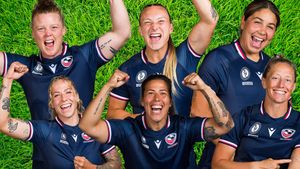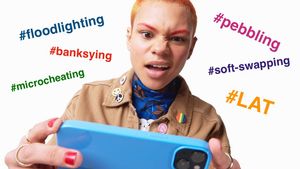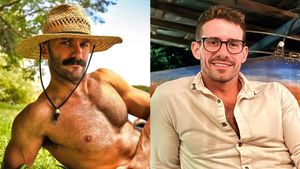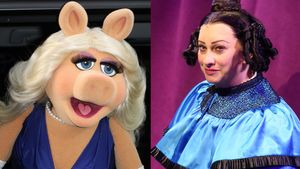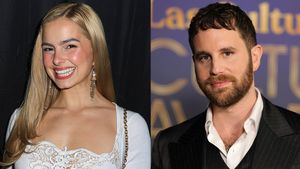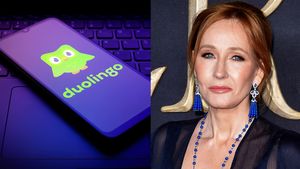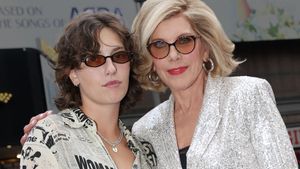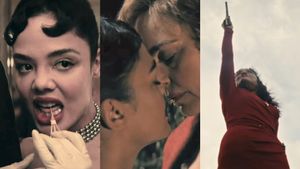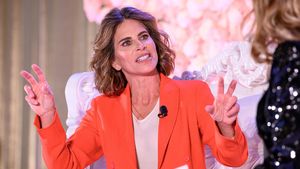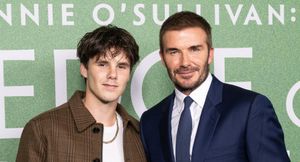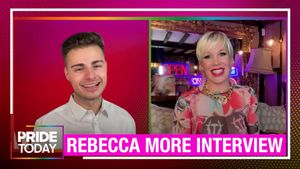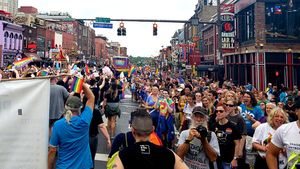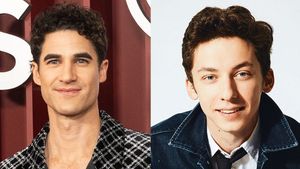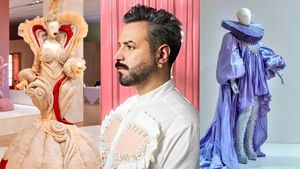
CONTACTAbout UsCAREER OPPORTUNITIESADVERTISE WITH USPRIVACY POLICYPRIVACY PREFERENCESTERMS OF USELEGAL NOTICE
© 2025 Equal Entertainment LLC.
All Rights reserved
All Rights reserved
By continuing to use our site, you agree to our Privacy Policy and Terms of Use.
We need your help
Your support makes The Advocate's original LGBTQ+ reporting possible. Become a member today to help us continue this work.
Your support makes The Advocate's original LGBTQ+ reporting possible. Become a member today to help us continue this work.
Catie Curtis's sweet, soulful sound has proven to be good for weddings, whether it be a real-life ceremony or one set at the end of a romantic comedy flick. After her last album, Sweet Life, Curtis noticed her music was being used in wedding ceremonies, so she took it one step further by offering her services to couples as an ordained minister. Now the New England-based singer-songwriter is back with another album, titled for a rather unusual visual experience.
The Advocate: What is the narrative of your newest album, Stretch Limousine on Fire?
Catie Curtis: Well, in general, I write about whatever I've been paying attention to. So the challenge for me is to deliver a well-written song about anything. It's less than narrative than there are certain images that I find compelling over a year. I notice things in a certain way, and then I write songs about them, and then I notice that they fit together. So it's not so much like, this thing, that thing, and another thing happened, so I wrote these songs. It's more like, for example, I'm driving in L.A., and I see a stretch limousine on fire.
Wait, you actually saw a limousine on fire? I thought it was sort of a metaphor or something!
It's compelling, and you don't know why -- it's sort of like a dream where it's compelling and you don't know why. It just sticks in your head. In the process of writing the song, I realized it makes other people feel better when we realize that everyone has bad days, and that we all have issues, whether it's with excessive wealth in this country, or the music business, or whatever.
So I got this idea about a shadow bird stuck in my head, and it made me think, What does it mean to be aware of the shadow side of things? I've written more about the loving and lightness side of things, so it was a good challenge to write a song about wanting stuff that's not necessarily good for you. I think in a way, there's a movement from the record Sweet Life, which at that point I was really absorbed on having young children. And your whole life at that point is focused on keeping them away from putting their finger in a socket, so it's hard to look up and see that there's other things going on in the world. So this record, I've had more of an opportunity to look at some bigger issues like marriage and mortality. So I guess there's more of a movement more toward outside of the house [laughs].
The song "I Do" on the record I actually wrote from my own experience, wanting to marry my partner, but I wrote it before I was just going to be at someone's wedding; I wasn't officiating it. I was just inspired by the fact that someone I knew was getting married. It's such a leap that people take, and it's just amazing that people ever feel sure enough about anything that they're willing to make it public like that and make a commitment.
You've played some pretty remarkable venues throughout your career. As an artist, what is it like to play at places like the Lilith Fair and the Michigan Womyn's Festival?
I do think that it's kind of unusual to play both the White House and the Michigan Womyn's Festival in one year. When I'm playing at like, the White House, I'm feeling like, Wow, here I am, an out lesbian, playing at the president's house! And then I'm at Michigan, and I'm feeling like, Here's this place that's nurtured and given strength to all these lesbians over the years, and I get to perform! It's like homecoming for me to play there. Lilith is more like an adrenaline [rush]. You end up doing to finale onstage, 20,000 people, and everyone gets one line in the finale to sing by themselves. It's crazy to realize that you're reaching 20,000 people. As a singer-songwriter, you're usually playing 500-seat places.
In the same vein, I play really intimate places still, and I play big theaters. To me, it's all about connecting to the people. When I go to hear music, I want to feel like the person playing is present, so I feel like the experience isn't all that different from venue to venue. I'm always just doing my thing.
Do you ever get freaked out when you hear your music on TV or in a film?
I love that. My kids are really funny about it. There's a Mary-Kate and Ashley Olsen movie that I have a song in, and my kids have watched it. I didn't warn them, and they're irritated. They're like, "Ma, your song is in this movie! Why did you put it in there!" like it's some sort of bother to them. But then they go tell all their friends about it.
How were you inspired early on to express yourself musically?
I grew up near Portland, Maine, and there was kind of a hippie thing still going on. I was able to get the last of the hippie vibe and learn the singer-songwriter, Crosby, Stills, and Nash kinda thing. Like most people who take to guitar, you start to pick out the chords right away. So within months of picking up the guitar, I started offering to play guitar in restaurants. I was actually asked to sing backup for Foreigner -- just one show at the Portland civic center. I kept getting to do more things here and there. Then I took my guitar to Brown University and I got more interested in the under-the-radar folk thing and started writing my own songs.
What inspired you to help young people become exposed to music?
I guess it was completely tied to the fact that I wouldn't have this life unless someone [helped with] my guitar. I wanted to buy it, and they got me over that hump. She said, "Take it, and promise me you'll learn to play it." And over the last few years, I put it out there to fans to help me raise money for instruments by donating to this endowment. We were able to raise about $11,0000 this summer, and we decided to toss it all out. This summer, we gave to the Portland, Boston, and L.A. Rock 'n' Roll Camps for Girls, the Fresh Air camps, and some smaller music organizations that focus on people of color and lower-income places that didn't have access to music education, specifically one in the Baltimore area.
Do you have any advice to any young singer-songwriters who are trying to break into the industry?
I think people can always try going to New York, L.A., or Nashville, but I never could stomach doing that, so I recommend finding your interest-based niche. Find out who is drawn to your music and what their interests are. These days you can create your own niche by playing to people that share similar interests, and I think there's lot of room for a wide variety of artists that way. You're not necessarily looking for commercial success, but if you just want to work as a musician, you can find an audience that way. Whether you're into outdoor education or gay parents, whatever it is, I think there's an audience for music, and you can break in from there. I've always felt a certain foundational support from the gay community, which has been so important to me.
Do you think it's less difficult for lesbian musicians to be out now compared to a decade ago?
I don't know individual to individual, but there seems to be a trend. I try to step back and look at how much progress is being made just by having gay marriage in so many states. I think that being out is so much easier when you have gay marriage, because there's some validation. I know even for my kids, it's important to them that we have the right to be married, because it makes them feel validated. So I think that feeling safe in your job and feeling safe as a performer, all of that is reinforced when people have the same civil rights.
I actually didn't seek it out. Over the years, I guess I've had 10- and 15- year relationships with some of my fans. And as I see them go through their professional lives, I'm really amazed and proud of what they've been able to accomplish. So I found some interest from them over the past couple of years, for them to be in my inner circle, so I formed an advisory board because I didn't start out as a business owner, I started out as a musician. I'm not particularly well equipped to be a business owner, so this board has been able to open a lot of doors for me. We were approached by someone who was actually interested in funding the record, and that was so humbling, to have someone offer to do that. It was great because I was thinking about the limitations of a budget, and this person said, 'Make the record you dream of. Make the record you want to make." So, I got to work with some folks in L.A. who work with Ray LaMontagne. I love his band. I basically hired musicians, who are known for interpreting the lyrics of the song that they're playing, and an engineer who really captures this live feel in the studio. You feel the humans behind the instruments.
And this team has included women business owners -- one owns a graphic design firm, one owns a social media company, there's a business school professor, and a record label executive, so it's been great to get business advice from fans who are very successful at what they do, and have offered to help. The music business is ever-changing. You have to be a survivor, you know? [laughs]
What made you want to become an ordained minister?
It came from, again, this long time relationship with fans, where a lot of people my music was in their lives when they were getting together with their person, and deciding to get married. And a lot of people have said that they've played my music at their weddings. So, first I played at a couple of people's weddings, and then I was watching someone officiate, and I thought, "I could do this!" It felt like a very natural extension for me. I'm comfortable talking about love, and I'm very drawn to the idea of a wedding ceremony -- how do you put it together? What do you really want to say with it? How do you make it express what you as a couple want to say as opposed to what's been doing traditionally? So I've really enjoyed creating ceremonies for couples, and then getting up there and standing with them as they're exchanging their vows.
From our Sponsors
Most Popular
Watch Now: Pride Today
Latest Stories
11 lesbian moments from the 'Hedda' trailer that left us gasping for more
August 21 2025 4:19 PM
Miss Piggy is going to Broadway—and 'Oh, Mary!' is squealing mad
August 21 2025 4:15 PM
Josh Sorbe is using his voice on Capitol Hill to fight for LGBTQ+ rights
August 21 2025 1:04 PM
Nashville Pride needs $250k to survive after losing corporate sponsors
August 21 2025 12:01 PM
Trump DOJ demands private medical information of transgender patients
August 21 2025 12:11 PM
Outrage after Florida quietly paints over Orlando Pulse shooting memorial
August 21 2025 10:56 AM
True
Watching JD Vance get called a 'couch-f*cker' by hecklers will have you smiling ear to ear
August 21 2025 4:17 PM

























